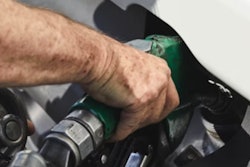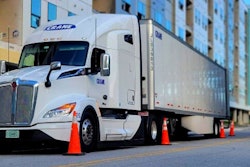If you’ve been in trucking for longer than a few months, you’re well aware of the boom cycle the industry experienced coming out of the early stages of the COVID-19 pandemic. Over the last year and some change, though, the industry has, of course, seen a downturn into what many believe to be a freight recession.
The lack of freight compared to the available capacity in trucking during recent times has made it difficult for fleets large and small. That, coupled with rising costs across the board due to inflation and other pressures, has made staying in business a challenge for many carriers.
Stephen Ritzler, team lead of trucking and logistics at insurance provider CoverWallet, joins Jason and Matt on this week's 10-44 to talk about how the recent freight cycles have impacted his industry and how it views trucking.
Contents of this video
00:00 Freight recession and insurance rates
02:09 Rookie mistakes
04:30 Small carriers going out of business
05:44 Successful small carriers
07:13 Dual facing cameras
08:52 Advice to drivers for saving on their premiums
Jason Cannon:
This week's 10-44 is brought to you by Chevron Delo 600 ADF ultra low ash diesel engine oil. It's time to kick some ash.
Matt Cole:
How the trucking boom of the COVID pandemic and the current freight recession have impacted insurance rates for carriers.
Jason Cannon:
You're watching CCJ's 10-44, a weekly episode that brings you the latest trucking industry news and updates from the editors of CCJ. Don't forget to subscribe and hit the bell for notifications so you'll never miss an installment of 10-44.
Hey everybody, welcome back. I'm Jason Cannon, and my co-host is always on the other side is Matt Cole. If you've been in this industry longer than just a few months, you're well aware of the boom cycle, the industry's experience coming out of the early stages of the COVID-19 pandemic. Now over the last year and some change though, there's been some downturns in the market to where we've hit right now, which a lot of people think is a freight recession.
Matt Cole:
The lack of freight compared to the available capacity in trucking during recent times has made it difficult for fleets large and small. That coupled with rising costs across the board due to inflation and other pressures has made staying in business a challenge for many carriers. Stephen Ritzler, team lead of trucking and logistics at insurance provider CoverWallet joins us this week to talk about how the recent freight cycles have impacted his industry and how it views trucking.
Stephen Ritzler:
CoverWallet is the digital growth engine of AON, which is one of the largest professional services firms, certainly in North America and in the world as a whole. And my role within the organization is new business for non-fleet motor carriers. So I help folks that are either entrepreneurs looking to get their business started or business owners looking to have a conversation about insurance. I help them buy, manage and remarket their auto liability and cargo insurance.
The way insurance pricing is driven is of course, profitability, but also historical losses. And there was unprecedented growth in the non-fleet sector in particular, lots more cargo vans and box-truck-area-type growth and smaller commercial operations as well with larger vehicles.
Jason Cannon:
Stephen said so-called rookie mistakes from new entrant trucking companies have been part of an uptick in insurance premiums.
Stephen Ritzler:
These rookie mistakes that folks were making, I can think of a client had we worked really hard to get his business started and didn't need just top a bridge with a truck on his first load. It was just so heartbreaking and as much as we can hammer in on the safety, some of these losses have played into the premiums in a really unpleasant way. I'd say that's the biggest impact I've seen is what used to be a $14,000 policy is on average 21,000 and up. I'm not on the carrier claims side of the house, but I can speak for the clients that I represent, and it's been really shocking. I guess not as shocking when you think about how new to the business they are. One of the things we use as a factor is how long have you been insured, what has your loss history been.
Matt Cole:
With capacity starting to leave the industry in recent months, much of that in the form of small carriers going out of business, the insurance industry has also had to adapt. We'll hear from Stephen on how after word from 10-44 sponsor, Chevron lubricants.
Jason Cannon:
Protecting your diesel engine and its aftertreatment system has traditionally been a double-edged sword. The same engine oil that is so essential to protecting your engine's internal parts is also responsible for 90% of the ash that is clogging up your DPF and upping your fuel and maintenance costs. Outdated industry thinking still sees a trade-off between engine and emission system protection, and Chevron was tired of it, so they spent a decade of R&D developing a no-compromise formulation.
Chevron lubricants developed a new ultra low ash diesel engine oil that is specifically designed to combat DPF ash clogging. Delo 600 ADF with omnimax technology cuts sulfate ash by whopping 60%, which reduces the rate of DPF clogging and extends DPF service life by two and a half times. And just think what you can do with all the MPGs you're going to add from cutting your number of regions. But Delo 600 ADF isn't just about after treatment. It provides complete protection extending drain intervals by preventing oil breakdown before you had to choose between protecting your engine or your aftertreatment system, and now you don't. 600 ADF from Delo with omnimax technology, it's time to kick some ash.
Stephen Ritzler:
It has been shocking how many customers we've seen go under and go out of business and sell off their equipment. We've had a few consolidations, we've seen some mergers, acquisitions type of activity. The biggest trend and the biggest challenge for us is the remarketing. So let's say you were one of these businesses who made it your first year. You paid enough of your bills, you built enough relationships and your safety was great. So then it's the challenge of, okay, so your insurance cost was at the limit of your budget year one, and now due to your poor performance safety-wise, in that first year, your renewal's coming in 25% higher. So the biggest challenge and opportunity, I should say for us is exploring other options for that second-year policy term and working on developing the relationships we currently have with the carriers that are newer to that space. And there's been a number of providers who saw this unprecedented growth and were excited to go get their ag out of that golden goose. So we're happy to keep steady flow of submissions going to some folks that are new to the non-fleet trucking space.
Jason Cannon:
Stephen says the most successful small carriers view their deductible as a cash reserve requirement, and they work towards self-insuring to a certain extent to save money, but that's not always recommended
Stephen Ritzler:
For the more savvy clients I've got that are able to dissect their policy and understand its anatomy. They look at a deductible as a cash reserve requirement and those businesses don't go under. And these people are seemingly doing better and better as the time goes on. So for customers, they're able to manage their costs and budget and plan ahead proactively, they can reduce coverage on things that they can now self-insure. For instance, physical damage. If you have an older truck, and you may find yourself in a position where when you first bought your policy, you were a hundred thousand dollars into a truck note, and now you've had your truck for a few years and it's paid down, and some of these people have seen enough depreciation on their vehicles and they have enough cash in the bank to have a down payment on another one that they're going without physical damage on their trucks.
And as an insurance professional, this isn't something we would ever recommend, but I'm seeing an increasing trend of people leaving coverages off in a fashion similar to that. They're also looking for more dedicated routes, what trucker is in. They want their routes where they can be home every night, less exposure on the road. They can double-up on loads that are less than truckloads so they can get more per mile. There's a lot more of these concentration strategies
Matt Cole:
As we discussed on the 1044 two weeks ago. Nuclear verdicts have impacts on the insurance industry as much as trucking. Stephen says, emerging technologies such as dual-facing cameras are becoming more common insurance requirements to fight them.
Stephen Ritzler:
Where preparation meets opportunity when it comes to nuclear verdicts are telematics and other electronic monitoring devices like dual-facing cameras, and that's where insurers right now are finding area of opportunity because certain providers that are more digitally-linked, for instance, certain insurance wholesale partners of ours require forward and driver-facing cameras for all insured risks that have auto liability coverage.
We're going to see an increased reliance on technology to drive color in the picture of what's actually happening at the time of a loss, because in the case of these nuclear verdicts, for instance, could you imagine the amount of value from an evidence standpoint? It would be if you could show for a fact that the driver wasn't texting, was sober, was buckled, and was observing proper precautions as opposed to a jury making assumptions.
It's really heartwarming to see the save that the insurance companies are able to make when there is an individual who ... Everyone that I know in the United States with a driver's license is aware that a rear end hit is a statutory rule. And when you have a trucker who's the victim of someone looking to defraud an insurance company because they pulled out in front of them, it's a wonderful thing when they can find justice because camera footage is able to exonerate them.
Jason Cannon:
Stephen also offers a few recommendations for carrier shopping for insurance to help save on their premiums.
Stephen Ritzler:
There's three things I'd recommend. Number one, know your numbers. It's really helpful when you have a conversation with an insurance producer like myself to be able to talk about what saving sounds like to you, because frankly, if we're taking the time out of our day to have a chat with you, it's not because we want to eat your lunch. It's because we want you to get that T-bone, right? We really are trying to help. We need your help to help you, so we don't want to waste your time, please don't waste ours. Let us know what the target is so we can help you hit it.
The second thing is to research. If you have a buddy who tells you he's got great insurance and you believe him, that's awesome. But if your buddy has a DoT number, you can also look up on his licensing and insurance page, who his provider is, and that'll give you a little bit more helpful ammo when you go to talk to your producer or even ask to talk to theirs. If they got them a great rate, they might be able to get you on.
And the last thing is, if you are a trucker who finds yourself in a position where you're in a holding pattern right now, you have enough cash to cover your basic insurance in your truck note, but the rates just aren't there for you and you want to hold it out for a little while, on the FMCSA licensing and insurance page, there is a published limit that's your required coverage for bodily injury and property damage. Unless you're a household goods mover, then your cargo coverage is also required, et cetera.
You can ask your insurer if they'd be willing to reduce your policy coverage limit down to your federal requirement in order to stave off large insurance premiums during this time that you are parking your truck. I wouldn't wish it for anyone or any insurance producer, but if you find yourself in that position, please don't let your authority lapse because it'll be six months or longer before you'll be doing business with anyone reputable again.
Jason Cannon:
That's it for this week's 10-44. You can read more on ccjdigital.com. While you're there, sign up for our newsletter and stay up to date on the latest in trucking industry news and trends. If you have any questions or feedback, please let us know in the comments below. Don't forget to subscribe and hit the bell for notifications so you can catch us again next week.










